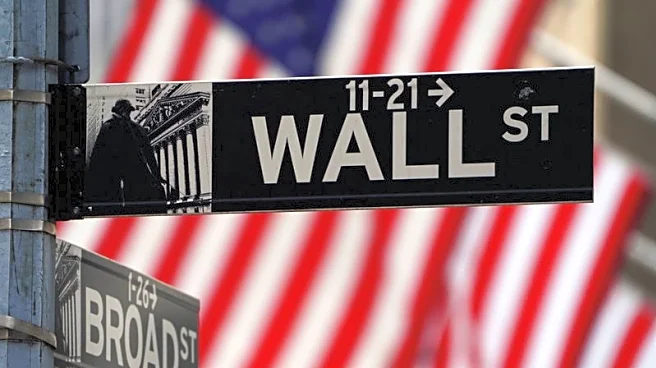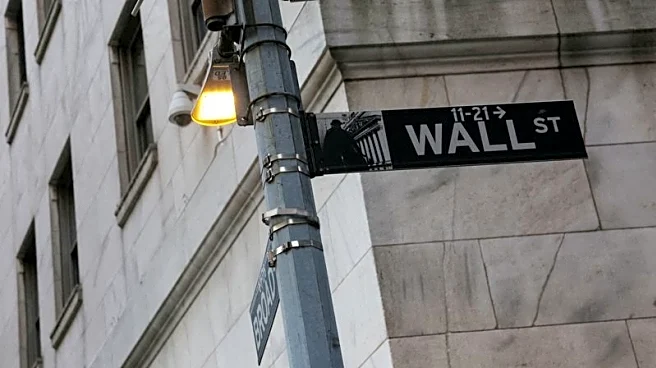By Naomi Rovnick
LONDON (Reuters) -An investor out of the United States and into Europe and Asia has reversed course as big money managers ride a wave of AI and interest rate-cut euphoria into the year-end,
ditching the "rest-of-the world" trade for now.
Global fund managers had offloaded U.S. stocks at a record pace after President Donald Trump unveiled steep reciprocal tariffs on April 2. The market has recovered since then, however, and U.S. stocks have surged 7% in the last quarter.
Wall Street's market supremacy is back and investors are likely to favor U.S. assets in the coming quarter as traders price in 110 basis points of Federal Reserve rate cuts by end-2026 and AI juggernauts boost analysts' stock market targets and U.S. economic growth.
"There's no need for pessimism right now about the U.S.," said Salman Ahmed, Fidelity International's global head of macroeconomics and strategic asset allocation. He was positive on U.S. small-cap stocks that typically benefit from rate cuts and had turned neutral on Europe and Japan.
The Fed last week cut rates for the first time since December.
BIG INVESTORS, IN U-TURN, BET ON US EQUITIES -BofA
In June, global fund managers surveyed by Bank of America were the most negative on U.S. stocks and the dollar out of all major asset classes. But by early September, these big investors were betting again on U.S. equities, buying back into the dollar and reducing exposure to euro zone, emerging market and UK stocks, BofA's survey showed.
Francesco Sandrini, Italy CIO at Europe's biggest investor Amundi, said he was currently tilting his portfolios towards the U.S. and expected smaller domestically focused companies to benefit in particular from rate cuts. He had turned less positive on European banks and Chinese stocks.
Data from fund tracking service Lipper, whose figures provide a snapshot of the global mood, showed investors resumed buying U.S. stocks in August after pulling almost $78 billion from the asset class in the three months prior.
Flows into euro zone funds that report to Lipper, which hit a 12-month high of almost $3 billion in April, dwindled to $563 million by August.
Investors said these moves showed how diversifying away from the U.S. was a better idea in theory than in practice.
"You cannot get away from the U.S.," Russell Investments global head of fixed income and foreign exchange solutions strategy Van Luu said. "Especially with equities."
Measured in dollars, the de facto reporting currency for many global investors, the benchmark S&P 500 index has outpaced its European equivalent since June. U.S. small caps have edged ahead of Europe's since late August.
Weekly flows into U.S. equity funds tracked by EPFR hit a year-to-date high of almost $58 billion last week as euro zone funds drew in just $1 billion and Japan funds registered zero net inflows, Barclays' analysis of the data showed.
TREASURIES BACK IN VOGUE
The U.S. asset comeback can also be seen in bonds.
French budget strife and Germany's borrowing bonanza have lifted euro zone bond yields by about 15 bps this quarter as equivalent U.S. yields have fallen by roughly the same amount. Bond yields move inversely to prices.
Of the major U.S. assets hit by April's tariff turmoil, only the dollar is lagging, but it has stabilised.
After the greenback posted its worst first-half of the year against the euro in the six months to June, an index measuring the greenback against rivals including the euro is up 0.8% this quarter.
Some investors said they were returning to Wall Street with one eye on the exit given medium-term risks such as Trump's trade levies exacerbating U.S. inflation and weighing on growth.
"The (market) momentum is certainly there, but let's take it quarter by quarter," Fidelity's Ahmed said.
He saw "shades of 2000" in the AI stock boom, warning that a repeat of that year's dotcom stock crash could create an economic shock by reducing consumer wealth.
U.S. households' equity ownership has hit a 75-year high and stocks owned directly or through retirement vehicles represent 68% of their total wealth, analysis of Fed data by consultancy Capital Economics showed.
"That should ring alarm bells, even if the buoyant stock market keeps rising for a while," Capital Economics said.
Foresight Group managing director Mayank Markanday expected U.S. savers who have parked a record $7.7 trillion in U.S. money market funds to move into domestic stocks or high-yielding U.S. corporate debt as rates fall.
"The only positive for the rest of the world is that valuations remain more attractive in relation to the U.S.," he said.
"However its definitely not the time to cut your U.S. exposure and swing heavily towards that rest-of-the-world trade."
(Reporting by Naomi Rovnick; editing by Dhara Ranasinghe and Bernadette Baum)









